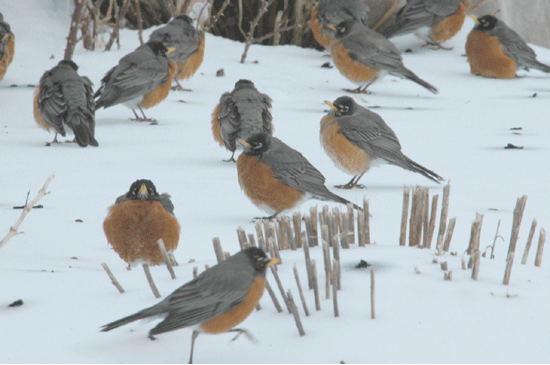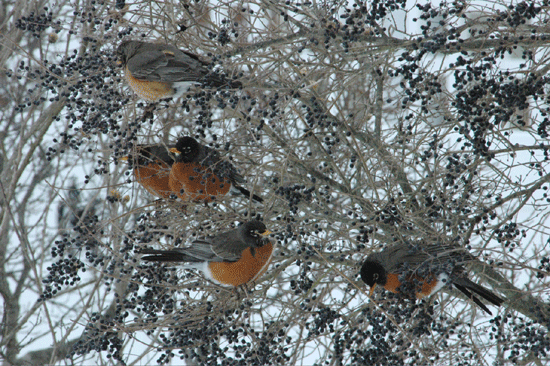Red Robin
Air Date: Week of March 20, 2009

(Courtesy of Salt Marsh Diary (c))
The robins came back too soon, says writer Mark Seth Lender, and found few food options.
Transcript
GELLERMAN: The red red robins have come bob-bob-bobbin’ back to the backyard of writer Mark Seth Lender.
But this year – the birds came back a bit too early. So they’ll just have to make do with what they find.
LENDER: Robins have arrived in the snow. Not the kind of snow you can peck through or scratch away. Snow like a salt glaze, bluish white, pebbly and shiny and slick as glass. They skip and skid upon the unexpected hardness of early Spring. This is what the robins have arrived to.

(Salt Marsh Diary (c))
There are at least a hundred. They blanket the yard like the snow they prance upon, snow that fell here on the coast only in inches, followed by hours of fine freezing hail. Where will they hide? In bushes without leaves? In trees with bare branches? What will they eat, these tuggers of worms, when all the worms in the world are fast asleep? Even if the tiny treading footsteps of the birds awakened them, could soft-bodied annelids, pushing and prodding and innocuous, crack that locked earthen door much less the icy clasp?
Between my yard and the next is a row of feral privet bushes. Feral because if they’ve ever been trimmed it was not by me. True confession? I hate privet. Hate the way it smells, the way it looks. What possible good could those ugly blue-black berries do if at the end of a long hard winter they are still there, dangling, a basket of stone fruit ignored by every hungry mouth to come this way all these starving months and days.
Except, that is exactly what the Robins are doing here. They are eating the inedible.

(Salt Marsh Diary (c))
It is not as if it doesn’t affect them. They stand dumbfounded on the snow, feathers bulging against cold and the apparent discomfort of what they have just consumed. It passes through them quickly or simply refuses to stay down. Purple stains spread against the whiteness. Yet, perched in the bushes or hopping between to find what has fallen, they eat until there is nothing left, not a single berry. And the next time I look, the robins have gone.
It is as if they have vanished. They are not on the road; not in the woods; none fly. Walking the edge of the salt marsh I pause and think perhaps like rats gorged on rat bane they have been driven to the river in desperate thirst and drowned there. But it is not illness. Only the hour has carried them away, that universal hour, that vacancy just before sleep.
The marsh is silent as a pillow. Inhaling, the air still tastes like winter but a robins show, You don’t need a weatherman to know which way the wind blows.
GELLERMAN: Mark Seth Lender writes a syndicated column called “Salt Marsh Diary.” You can see some of his photos and find out more about his writing at our website: loe.org.
Links
Living on Earth wants to hear from you!
Living on Earth
62 Calef Highway, Suite 212
Lee, NH 03861
Telephone: 617-287-4121
E-mail: comments@loe.org
Newsletter [Click here]
Donate to Living on Earth!
Living on Earth is an independent media program and relies entirely on contributions from listeners and institutions supporting public service. Please donate now to preserve an independent environmental voice.
NewsletterLiving on Earth offers a weekly delivery of the show's rundown to your mailbox. Sign up for our newsletter today!
 Sailors For The Sea: Be the change you want to sea.
Sailors For The Sea: Be the change you want to sea.
 The Grantham Foundation for the Protection of the Environment: Committed to protecting and improving the health of the global environment.
The Grantham Foundation for the Protection of the Environment: Committed to protecting and improving the health of the global environment.
 Contribute to Living on Earth and receive, as our gift to you, an archival print of one of Mark Seth Lender's extraordinary wildlife photographs. Follow the link to see Mark's current collection of photographs.
Contribute to Living on Earth and receive, as our gift to you, an archival print of one of Mark Seth Lender's extraordinary wildlife photographs. Follow the link to see Mark's current collection of photographs.
 Buy a signed copy of Mark Seth Lender's book Smeagull the Seagull & support Living on Earth
Buy a signed copy of Mark Seth Lender's book Smeagull the Seagull & support Living on Earth

